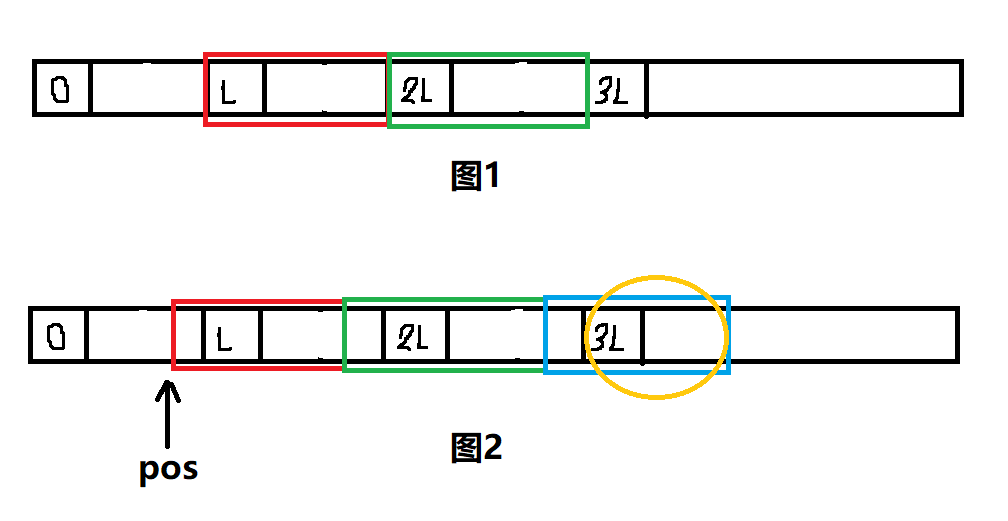SPOJ687 Repeats
本篇是罗穗骞《后缀数组——处理字符串的有力工具》的读书笔记。
知识点: 后缀数组、RMQ
解题思路:
枚举长度 \(L\),然后检查长度为 \(L\) 的子串最多能连续重复几次。
对于给定的字符串 \(S\),我们只关注其上坐标为 \(0, L, 2L, ......\) 的点。
如果连续重复子串的首字符恰好在这些点上,那么连续重复子串出现的次数恰好是 \( \frac{lcp(L_1, L_2)}{L} + 1\),(注:\(lcp\) 为 Longest Common Prefix 的简写),如图 1 所示;
否则,我们先计算出 \(lcp(L_1, L_2)\) 中 模 \( L\) 后余下的长度 \(L'\),如图 2 中橙色圈里的片段,可以推测出连续重复子串真正的首字符位于 \( pos = L_1 - (L - L')\),如果 \(0 \le pos\),则连续重复子串出现的次数为:\( \frac{lcp(pos, pos+L)}{L} + 1\)。
记录出现的最多次数,即为答案。最长公共前缀的查询要用 RMQ 优化。

AC代码:
1 #include <iostream> 2 #include <cstdio> 3 #include <algorithm> 4 5 using namespace std; 6 const int maxn = 50000 + 5, inf = 0x7fffffff; 7 int len, tk; 8 int Rank[maxn], tmp[maxn]; 9 int S[maxn]; 10 int sa[maxn], lcp[maxn]; 11 12 bool compare_sa(int i, int j) { 13 if (Rank[i] != Rank[j]) return Rank[i] < Rank[j]; 14 else { 15 int ri = i + tk <= len ? Rank[i + tk] : -1; 16 int rj = j + tk <= len ? Rank[j + tk] : -1; 17 return ri < rj; 18 } 19 } 20 21 void construct_sa() { 22 for (int i = 0; i <= len; i++) { 23 sa[i] = i; 24 Rank[i] = i < len ? S[i] : -1; 25 } 26 27 for (tk = 1; tk <= len; tk *= 2) { 28 sort(sa, sa + len + 1, compare_sa); 29 tmp[sa[0]] = 0; 30 for (int i = 1; i <= len; i++) { 31 tmp[sa[i]] = tmp[sa[i - 1]] + (compare_sa(sa[i - 1], sa[i]) ? 1 : 0); 32 } 33 for (int i = 0; i <= len; i++) { 34 Rank[i] = tmp[i]; 35 } 36 } 37 } 38 39 void construct_lcp() { 40 int h = 0; 41 lcp[0] = 0; 42 for (int i = 0; i < len; i++) { 43 int j = sa[Rank[i] - 1]; 44 45 if (h > 0) h--; 46 for (; j + h < len && i + h < len; h++) { 47 if (S[j + h] != S[i + h]) break; 48 } 49 lcp[Rank[i] - 1] = h; 50 } 51 } 52 53 int RMQ[maxn]; 54 int mm[maxn], best[20][maxn]; 55 void initRMQ(int n) { 56 mm[0] = -1; 57 for (int i = 1; i <= n; i++) 58 mm[i] = ((i&(i - 1)) == 0) ? mm[i - 1] + 1 : mm[i - 1]; 59 for (int i = 1; i <= n; i++) best[0][i] = i; 60 for (int i = 1; i <= mm[n]; i++) { 61 for (int j = 1; j + (1 << i) - 1 <= n; j++) { 62 int a = best[i - 1][j]; 63 int b = best[i - 1][j + (1 << (i - 1))]; 64 if (RMQ[a] < RMQ[b]) best[i][j] = a; 65 else 66 { 67 best[i][j] = b; 68 } 69 } 70 } 71 } 72 int askRMQ(int a, int b) { 73 int t; 74 t = mm[b - a + 1]; 75 b -= (1 << t) - 1; 76 a = best[t][a]; b = best[t][b]; 77 return RMQ[a] < RMQ[b] ? a : b; 78 } 79 int find_lcp(int a, int b) { 80 if (a>b) swap(a, b); 81 return lcp[askRMQ(a, b - 1)]; 82 } 83 int main() 84 { 85 char inp[5]; 86 int H; 87 scanf("%d", &H); 88 while (H--) { 89 scanf("%d", &len); 90 for (int i = 0; i<len; i++) { 91 scanf("%s", inp); 92 if (inp[0] == 'a') S[i] = 0; 93 else S[i] = 1; 94 } 95 construct_sa(); 96 construct_lcp(); 97 for (int i = 1; i <= len; i++) RMQ[i] = lcp[i]; 98 initRMQ(len); 99 int ans = 1; 100 for (int i = 1; i <= len; i++) { 101 int ret = 0; 102 for (int j = 0; j + i<len; j += i) { 103 int r1 = Rank[j], r2 = Rank[j + i]; 104 int L = find_lcp(r1, r2); 105 int temp = L / i + 1; 106 int k = j - (i - L%i); 107 if (k >= 0) { 108 temp = find_lcp(Rank[k], Rank[k + i]) / i + 1; 109 } 110 ret = max(ret, temp); 111 } 112 ans = max(ans, ret); 113 } 114 printf("%d\n", ans); 115 } 116 return 0; 117 }
“这些年我一直提醒自己一件事情,千万不要自己感动自己。大部分人看似的努力,不过是愚蠢导致的。什么熬夜看书到天亮,连续几天只睡几小时,多久没放假了,如果这些东西也值得夸耀,那么富士康流水线上任何一个人都比你努力多了。人难免天生有自怜的情绪,唯有时刻保持清醒,才能看清真正的价值在哪里。”



 浙公网安备 33010602011771号
浙公网安备 33010602011771号